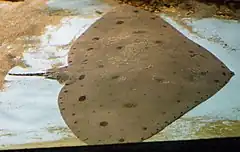| Gymnuridae | |||
| Fowler, 1934[1] | |||
 Przedstawiciel rodziny – ptaszyca japońska (G. japonica) | |||
| Systematyka | |||
| Domena | |||
|---|---|---|---|
| Królestwo | |||
| Typ | |||
| Podtyp | |||
| Gromada | |||
| Podgromada | |||
| Infragromada | |||
| (bez rangi) | płaszczki | ||
| Rząd | |||
| Rodzina |
Gymnuridae | ||
| Typ nomenklatoryczny | |||
|
Rodzina: Gymnura van Hasselt, 1823 | |||
| Synonimy | |||
| |||
| Rodzaje i gatunki | |||
| |||
Gymnuridae – monotypowa rodzina chrzęstnoszkieletowych z rzędu orleniokształtnych (Myliobatiformes). Ryby z tej rodziny określane są nazwą „płaszczki-motyle”[11].
Rozmieszczenie geograficzne
Do rodziny należą gatunki występujące w wodach oceanów – Atlantyckiego, Indyjskiego i Spokojnego[4][12].
Cechy charakterystyczne
Ciało silnie spłaszczone, krótkie. Ogon krótki. Płetwy piersiowe bardzo szerokie (stąd nazwa motyle), połączone z głową[12]. Długość ciała do 400 cm; masa ciała (największa opublikowana) 60 kg[12].
Systematyka
Rodzaj zdefiniował w 1823 roku niemiecki botanik i zoolog Johan Coenraad van Hasselt w artykule będącym przedrukiem listu van Hasselta do Temmincka opublikowanym w czasopiśmie Algemeene Konst- en Letter-bod[10]. Gatunkiem typowym jest (oznaczenie monotypowe) G. micrura.
Etymologia
- Uroxys: gr. ουρα oura ‘ogon’[13]; οξυς oxus ‘ostry, spiczasty’[14]. Gatunek typowy (oznaczenie monotypowe): Raja maclura Lesueur, 1817 (= Raja altavela Linnaeus, 1758).
- Gymnura: gr. γυμνος gumnos ‘goły, nagi’; ουρα oura ‘ogon’[15].
- Pteroplatea: gr. πτερον pteron ‘skrzydło, płetwa’[16]; πλατυς platus ‘szeroki’[17]. Gatunek typowy (późniejsze oznaczenie monotypowe): Raja altavela Linnaeus, 1758[18].
- Aetoplatea: gr. αετος aetos ‘gatunek płaszczki’[19]; πλατυς platus ‘szeroki’[17]. Gatunek typowy (oznaczenie monotypowe): Aetoplatea tentaculata Valenciennes, 1841.
- Phanerocephalus: gr. φανερος phaneros ‘widoczny, otwarty’, od φαινω phainō ‘pokazać, ukazać’[20]; -κεφαλος -kephalos ‘-głowy’, od κεφαλη kephalē ‘głowa’ [21]. Gatunek typowy (oznaczenie monotypowe): Phanerocephalus ellioti Gratzianov, 1906 (nomen dubium).
Podział systematyczny
Do rodziny należy jeden rodzaj z następującymi występującymi współcześnie gatunkami[4]:
- Gymnura altavela (Linnaeus, 1758) – ptaszyca[22]
- Gymnura australis (Ramsay & Ogilby, 1886)
- Gymnura crebripunctata (Peters, 1869)
- Gymnura hirundo (Lowe, 1843)
- Gymnura japonica (Temminck & Schlegel, 1850) – ptaszyca japońska[23]
- Gymnura lessae Yokota & Carvalho, 2017
- Gymnura marmorata (Cooper, 1864)
- Gymnura micrura (Bloch & Schneider, 1801)
- Gymnura natalensis (Gilchrist & Thompson, 1911)
- Gymnura poecilura (Shaw, 1804)
- Gymnura sereti Yokota & Carvalho, 2017
- Gymnura tentaculata (Valenciennes, 1841)
- Gymnura zonurus (Bleeker, 1852)
Opisano również gatunki wymarłe:
Zobacz też
Uwagi
- ↑ Typ nomenklatoryczny: Pteroplatea Müller & Henle, 1837 (= Gymnura van Hasselt, 1823).
- ↑ Pisownia oryginalna, takson zdefiniowany w randze podrodziny.
- ↑ Nomen nudum.
- ↑ Najprawdopodobniej nomen oblitum[4].
- ↑ Nieuzasadniona poprawka Aetoplatea Valenciennes, 1841.
Przypisy
- 1 2 H.W. Fowler. Descriptions of new fishes obtained 1907 to 1910, chiefly in the Philippine Islands and adjacent seas. „Proceedings of the Academy of Natural Sciences of Philadelphia”. 85, s. 241, 1934. JSTOR: 4064176. (ang.).
- ↑ T.N. Gill. Catalogue of the fishes of the east coast of North America. „Report on the condition of the sea fisheries of the south coast of New England”. 1, s. 790, 1873. (ang.).
- ↑ C.S. Rafinesque: Analyse de la nature, or, Tableau de l’univers et des corps organisés. Palerme: Aux dépens de l’auteur, 1815, s. 93. (fr.).
- 1 2 3 Ron Fricke, William Neil Eschmeyer, Richard Van der Laan (red.), SEARCH, [w:] Eschmeyer's Catalog of Fishes, California Academy of Sciences, 2 kwietnia 2024 [dostęp 2024-04-18] (ang.).
- ↑ C.S. Rafinesque. Journal of the Academy of Natural Sciences of Philadelphia. Vol. i. Part I. Philadelphia. 8vo. pp. 220, and 9 plates. May to December, 1817. „The American Monthly Magazine and Critical Review”. 3 (4), s. 272, 1818. (ang.).
- ↑ J.P. Müller & J. Henle. Über die Gattungen der Haifische und Rochen nach einer von ihm mit Hrn. Henle unternommenen gemeinschaftlichen Arbeit über die Naturgeschichte der Knorpelfische. „Bericht über die zur Bekanntmachung geeigneten Verhandlungen der Königlichen Preussischen Akademie der Wissenschaften zu Berlin”. Jahrgang 1837, s. 117, 1837. (niem.).
- ↑ J.P. Müller & F.G.J. Henle: Systematische Beschreibung der Plagiostomen. Barlin: Veit, 1839, s. 175. (niem.).
- ↑ Index universalis. W: L. Agassiz: Nomenclator zoologicus, continens nomina systematica generum animalium tam viventium quam fossilium, secundum ordinem alphabeticum disposita, adjectis auctoribus, libris, in quibus reperiuntur, anno editionis, etymologia et familiis, ad quas pertinent, in singulis classibus. Soloduri: Jent et Gassmann, 1842–1846, s. 10. (łac.).
- ↑ V.I. Gratzianov. Über eine besondere Gruppe der Rochen. „Zoologischer Anzeiger”. 30 (13/14), s. 400, 1906. (niem.).
- 1 2 J.C. van Hasselt. Uittreksel uit een’ brief. „Algemeene Konst- en Letter-bode”. Voor het jaar 1823 (1), s. 316, 1823. (niderl.).
- ↑ Włodzimierz Załachowski: Ryby. Warszawa: Wydawnictwo Naukowe PWN, 1992, s. 369. ISBN 83-01-12286-2.
- 1 2 3 R. Froese & D. Pauly: Family Gymnuridae - Butterfly rays. FishBase (ver. (02/2024)). [dostęp 2024-04-18]. (ang.).
- ↑ Jaeger 1959 ↓, s. 276.
- ↑ Jaeger 1959 ↓, s. 179.
- ↑ Ch. Scharpf: Family Gymnuridae Fowler 1934 (Butterfly Rays). The ETYFish Project. [dostęp 2024-04-18]. (ang.).
- ↑ Jaeger 1959 ↓, s. 211.
- 1 2 Jaeger 1959 ↓, s. 200.
- ↑ Ch.L. Bonaparte: Systema Ichthyologicum. Rome: 1839, s. 2. (łac.).
- ↑ Jaeger 1959 ↓, s. 9.
- ↑ Jaeger 1959 ↓, s. 191.
- ↑ Jaeger 1959 ↓, s. 50.
- ↑ S. Rutkowicz: Encyklopedia ryb morskich. Gdańsk: Wydawnictwo morskie, 1982, s. 154. ISBN 83-215-2103-7.
- ↑ D. Szatańska: Ryby: encyklopedia zwierząt. Warszawa: Wydawnictwo Naukowe PWN, 2007, s. 1–208. ISBN 978-83-01-15140-9.
- ↑ Pollerspöck i Straube 2023 ↓, s. delpiti.
- ↑ Pollerspöck i Straube 2023 ↓, s. grootaerti.
- ↑ Pollerspöck i Straube 2023 ↓, s. hovestadti.
- ↑ Pollerspöck i Straube 2023 ↓, s. laterialata.
- ↑ Pollerspöck i Straube 2023 ↓, s. transita.
Bibliografia
- E.C. Jaeger: Source-book of biological names and terms. Wyd. 3 (Revised second printing). Springfield: Charles C. Thomas, 1959, s. 1–316. (ang.).
- J. Pollerspöck & N. Straube: Bibliography Database of living/fossil sharks, rays and chimaeras (Chondrichthyes: Elasmobranchii, Holocephali). shark.refrences.com, 2023. [dostęp 2024-04-16]. (ang.).